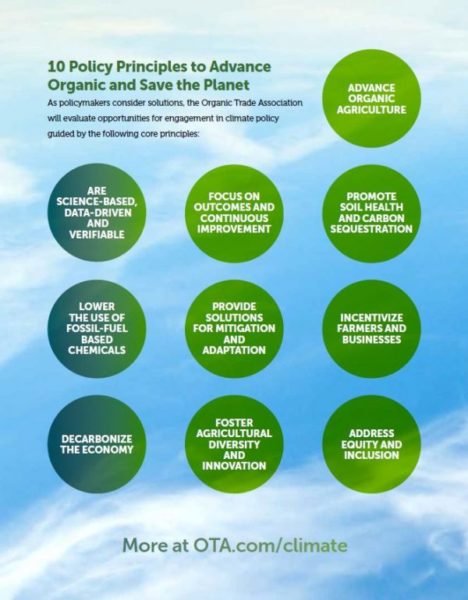Elevating Organic: Report Positions Organic as ‘Time-Tested’ Tool for Stemming Climate Change Impacts
A major new report from the Organic Trade Association (OTA) highlights organic agriculture's multiple climate change mitigation benefits and ways it can be harnessed to stem, and even reverse, climate impacts.
Advancing Organic to Mitigate Climate Change identifies policy opportunities to elevate the role of organic in the climate change discussion, support organic farmers and encourage transition to organic farming.
Publications of the white paper follows the recent launch of the US trade association’s Climate Task Force. The task force will amplify the trade association’s voice in climate policy discussions by advocating for policies that address the association’s core principles and sharing recommendations with lawmakers and key stakeholders.
“Our climate crisis is real, is immediate, and affects us all. It is clear that urgent action is needed to help us mitigate and adapt to this crisis,” said Avi Garbow, Organic Trade Association board member and environmental advocate for Patagonia Works. “While the nation’s conventional agricultural sector’s emissions and practices contribute to our worsening climate, there is a time-tested climate solution that regenerates our soils, nourishes our communities, and safeguards our environment from harmful synthetic chemicals: organic agriculture.”
Garbow, a recognized environmental leader in the US who served as the General Counsel at the Environmental Protection Agency from 2013-2017, added: “The Organic Trade Association, through the work of its members, the Climate Task Force and its research and analysis, will ensure that organic is well-positioned to play a leading and cost-effective role in stemming and ultimately reversing the effects of our changing climate.”
The Ten Principles
The OTA’s Board of Directors early this year agreed that organic had to be elevated in the climate change policy discussions that are increasingly taking place in the halls of Congress, in government offices, in corporate boardrooms.

In June at the association’s annual meeting, the OTA Board set out ten principles for climate policy that:
1. Advance organic agriculture. Any policy that addresses the role of climate change in food and agriculture should advance the opportunity for organic to be a climate change solution, allow organic to be successful, and not undermine organic.
2. Are science-based, data-driven and verifiable. Policy solutions should be based on and supported by science and data, with strong verification measures to meaningfully reduce agriculture’s impact on climate change.
3. Focus on outcomes and continuous improvement. Policies should reward the outcomes of good agricultural practices and enable a system of continuous improvement that achieves specific positive outcomes over time.
4. Promote soil health and carbon sequestration. Improving soil health is an important and central component in addressing agriculture’s role in climate change. Policies should include provisions for advancing soil health and carbon sequestration. .
5. Lower the use of fossil-fuel based chemicals: Chemical fertilizers and pesticides are a key source of greenhouse gas emissions in agriculture. Climate policies should minimize the use of and eliminate the dependency on fossil-fuel based inputs, especially synthetic nitrogen fertilizers.
6. Provide solutions for mitigation and adaptation: Policies should provide the resources to not only mitigate the impacts of climate change but also help the agricultural sector adapt to a changing climate.
7. Incentivize farmers and businesses: Farmers should not have to bear the brunt when making transformational changes. Public and private sector programs should provide tools and resources to achieve outcomes through market-based incentives or financial payments that encourage conservation practices or ecosystem services.
8. Decarbonize the economy: Policies that increase greenhouse gas emissions or rollback progress in decarbonizing the economy and reducing emissions should be opposed.
9. Foster agricultural diversity and innovation: Climate policies should foster diversity and innovation in farming systems, and provide incentives for increasing diversity in cropping systems.
10. Address equity and inclusion: Policies should address the environmental and economic inequities caused by climate change, and include ways to support disadvantaged communities in adapting to climate change.
“Among the many threats posed by the climate crisis, perhaps the greatest is the potential it has to impact food production. The good news is that organic farmers are already focused on building soil health and eliminating the use of synthetic fertilizers, two steps that can help agriculture shift from being a source of greenhouse gas emissions to being a net sink,” said Britt Lundgren, director of organic and sustainable agriculture at Stonyfield Farm and member of the association’s Board.
“At Stonyfield we are excited to be working with the Organic Trade Association’s Climate Change Task Force on advancing organic agriculture as a climate change solution. The climate change principles adopted by the association provide a roadmap for how federal policy can support climate mitigation and adaptation in agriculture.”
-
Get your FREE ticket
- REGISTER FOR FREE
